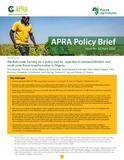| dc.contributor.author | Muyanga, Milu | |
| dc.contributor.author | Jayne, Thomas S. | |
| dc.contributor.author | Aromolaran, Adebayo B. | |
| dc.contributor.author | Liverpool-Tasie, Lenis Saweda O. | |
| dc.contributor.author | Adelaja, Adesoji | |
| dc.contributor.author | Awokuse, Titus | |
| dc.contributor.author | Omotilewa, Oluwatoba J. | |
| dc.contributor.author | George, Justin | |
| dc.contributor.author | Issa, Fadlullah O. | |
| dc.contributor.author | Obayelu, Abiodun E. | |
| dc.coverage.spatial | Nigeria | en |
| dc.date.accessioned | 2022-04-20T11:34:13Z | |
| dc.date.available | 2022-04-20T11:34:13Z | |
| dc.date.issued | 2022-04-01 | |
| dc.identifier.citation | Muyanga, M.; Jayne, T.S.; Aromolaran, A.B.; Liverpool-Tasie, L.S.O.; Adelaja, A.; Awokuse, T.; Omotilewa, O.O.; George, J.; Issa, F.O. and Obayelu. A.E. (2022) Medium-scale Farming as a Policy Tool for Agricultural Commercialisation and Small-scale Farms Transformation in Nigeria. APRA Brief 32. Brighton: Future Agricultures Consortium, DOI: 10.19088/APRA.2022.015 | en |
| dc.identifier.isbn | 978-1-78118-965-8 | |
| dc.identifier.uri | https://opendocs.ids.ac.uk/opendocs/handle/20.500.12413/17333 | |
| dc.description.abstract | Recent evidence suggests that the changing structure of land ownership in sub-Saharan Africa is one of the major new trends affecting African agri-food systems. Research in several African countries shows a rapid rise of medium-scale farms (MSFs) of 5–50ha. MSFs have become an important force for increasing agricultural production, particularly in countries with significant unutilised arable land and potential for area expansion, such as Ghana, Nigeria, Tanzania and Zambia. Most African countries’ national agricultural investment plans and policy strategies officially regard the smallholder farming sector as the main vehicle for achieving agricultural growth, food security, and poverty reduction objectives. However, many governments have adopted land and financial policies that implicitly encourage the rise of emergent MSFs. Given the documented rise in MSFs in many African countries, the APRA Nigeria Work Stream 1 team developed a research agenda focused on understanding the potentially complex ways in which these farms affect the productivity and commercialisation potential of small-scale farms (SSFs). We investigated the characteristics of MSFs, the processes that produces them, their relative importance in the agricultural commercialisation process, the relationship between farm scale and productivity, and whether MSFs influence the behaviour and welfare of the millions of SSF households around them. Our findings are based on two years of survey data on MSFs and nearby SSFs in 2019 and 2021 in Ogun and Kaduna states. This policy brief summarises our main findings, drawing upon several APRA-supported reports. | en |
| dc.language.iso | en | en |
| dc.publisher | APRA, Future Agricultures Consortium | en |
| dc.rights.uri | http://creativecommons.org/licenses/by-nc-nd/4.0/ | en |
| dc.subject | Agriculture | en |
| dc.subject | Development Policy | en |
| dc.subject | Economic Development | en |
| dc.subject | Poverty | en |
| dc.subject | Rural Development | en |
| dc.title | Medium-Scale Farming as a Policy Tool for Agricultural Commercialisation and Small-Scale Farms Transformation in Nigeria | en |
| dc.type | Series paper (non-IDS) | en |
| dc.rights.holder | APRA, Future Agricultures Consortium | en |
| dc.identifier.team | Rural Futures | en |
| dc.identifier.doi | 10.19088/APRA.2022.015 | |
| dcterms.dateAccepted | 2022-04-01 | |
| rioxxterms.funder | Department for International Development, UK Government | en |
| rioxxterms.identifier.project | APRA | en |
| rioxxterms.version | VoR | en |
| rioxxterms.versionofrecord | 10.19088/APRA.2022.015 | en |
| rioxxterms.funder.project | e1f6d3be-457a-4f13-8b1f-6748d1402d83 | en |


